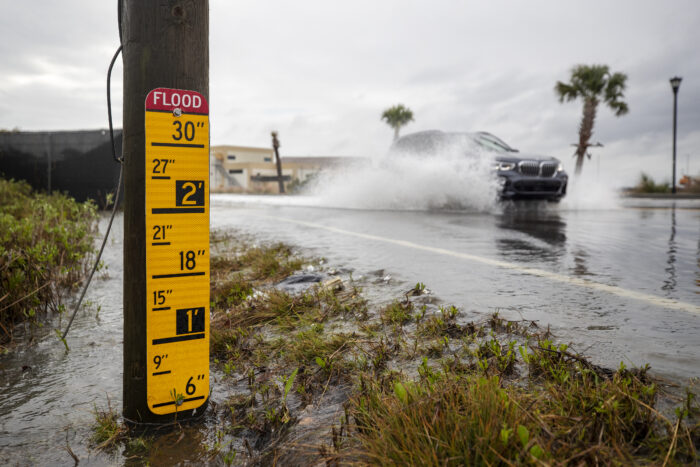Reducing emissions, protecting communities get a boost
The South is beginning to realize its full potential to make progress on climate. For the first time, every state and large municipality in our region – Alabama, Tennessee, Virginia, Georgia, North Carolina, and South Carolina – has a roadmap to reduce greenhouse gas emissions and other harmful air pollution.
This week, Southern governors and mayors submitted Priority Climate Action Plans as the first deliverable under the Environmental Protection Agency’s Climate Pollution Reduction Planning Grant.
The locally-led process will draw critical new funding for high-impact projects that protect health and create economic opportunity.
Alys Campaigne, Climate Initiative Leader
In March 2023, 46 states sought and received $3 million each in planning grant funds to develop ambitious plans to inventory and reduce sources of greenhouse gases and other harmful air pollution. Sixty-seven of the largest metropolitan areas also received $1 million each.
“The South plays an outsized role in contributing to climate change and severe, accelerating impacts are affecting vulnerable residents with higher pollution exposure and less ability to adapt,” says Climate Initiative Leader Alys Campaigne. “We now have sector-based data on the sources of climate pollution and a roadmap for taking meaningful action to curb it in each of our six Southern states. The locally-led process will draw critical new funding for high-impact projects that protect health and create economic opportunity as our region adapts to climate change.”
The climate plans are the launch pad for the next phase of the grant process: $4.6 billion is available in competitive grants for states, local governments, tribes, and territories to implement projects to improve air quality and reduce greenhouse gas emissions. Implementation grant applications are due on April 1, 2024.
Other highlights identified during the initial phase of the Climate Pollution Reduction Grant process:
-
- Georgia: transportation electrification, energy efficiency, increased availability of renewable power, better waste diversion and landfill management, sustainable land use, and management of refrigerants
-
- South Carolina: expanded weatherization and energy efficiency programs, Climate Smart Forestry, enhanced protection of land that can store carbon, organic waste recover programs, and transportation programs to provide alternatives to driving
-
- Virginia: cleaner cars and more transportation options, industrial energy efficiency, methane capture, renewable energy generation, building electrification, preservation and restoration of coasts, wetlands, and forests
-
- Tennessee: increasing electric light and medium-duty vehicles, expansion of the fast-charging network
-
- Alabama: transportation electrification, energy efficiency, waste management
-
- North Carolina: equitable clean transportation funding, expanded renewable power, grid resilience, expanded recycling and waste management, building energy efficiency and protection of natural landscapes that can store carbon
“This is an important moment for climate action in the South,” says Campaigne.
The South is ground-zero for the causes and effects of climate change, as increasing weather disasters, rising heat and sea levels, and air pollution put our communities at risk, especially our low-income, rural, and Black and Brown communities, which are experiencing disproportionate impacts.

These plans – in tandem with a recent boom in clean energy manufacturing investments – reflect growing locally-led momentum to address the increasing impacts of climate change on the region. The PCAP plans will help draw other competitive public and private climate and energy investments.
The Inflation Reduction Act’s historic climate funding touches 135 federal programs – already the South has drawn funding for energy efficiency, renewable energy, electrification of bus fleets, and clean energy projects on farms. These statewide roadmaps position our region to accelerate investments in high-impact projects that will protect our most vulnerable residents.
Overall, the climate plans show that transportation emissions remain the largest source of pollution in each of our six states. Fortunately, inventories also show that emissions from the electricity sector are going down, further reminding us why we must stop the expansion of methane gas buildout in the South.
The recently released Fifth National Climate Assessment emphasized the need for natural climate solutions in our strategy to address impacts and create more resilient communities. The solutions include protecting wetlands and other natural systems that help buffer against flooding and utilizing forests and farms to store carbon, which are some of the solutions that states are looking to implement with the help of federal funding.
This is an important moment for climate action in the South.
Alys Campaigne, Climate Initiative Leader
We applaud the governors and mayors taking action to draw historic federal funding to reduce greenhouse gases and other air pollution and protect communities in the South from extreme heat, floods, and storms.
States will submit implementation grant funding requests on April 1. They then will work with local stakeholders to create more comprehensive plans to submit to EPA by 2025.
SELC looks forward to working with states and localities to implement meaningful climate solutions across the South.
